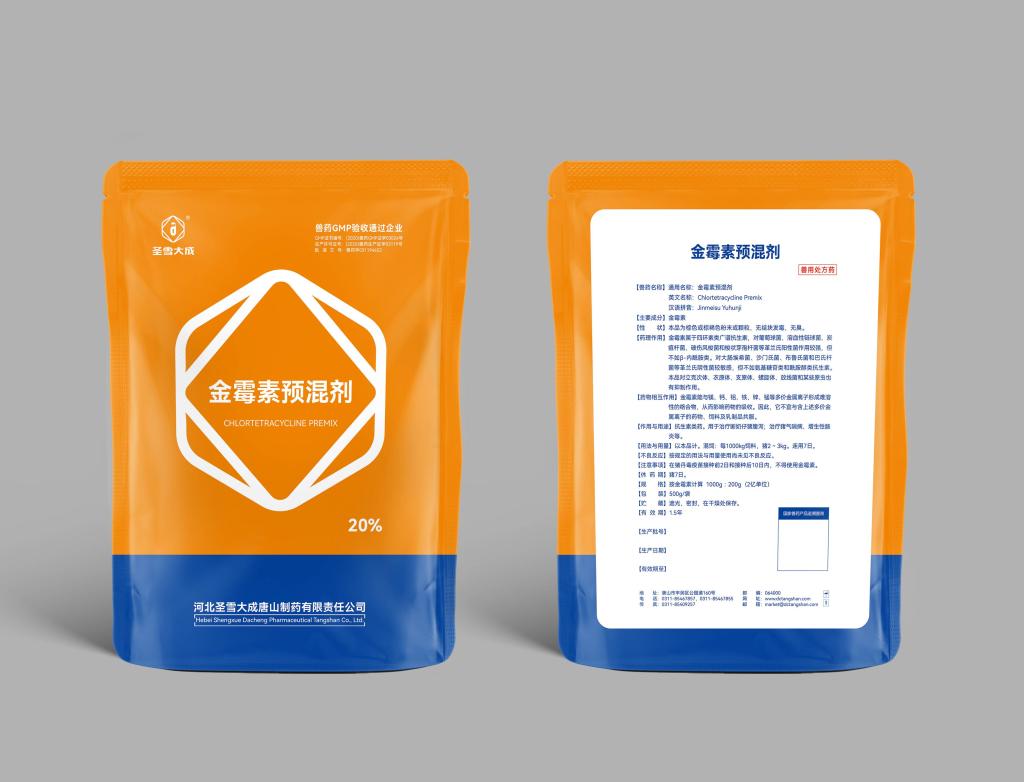Tel:0086 18231198596

News
Chlortetracycline Premix: A sustainable solution for improving animal welfare standards.
TIME:2024-06-07
Understanding Chlortetracycline
Mechanisms of Action:
Chlortetracycline is a broad-spectrum antibiotic that inhibits bacterial protein synthesis by binding to the bacterial ribosome.
Its bacteriostatic activity makes it effective against a wide range of bacterial pathogens commonly associated with respiratory, gastrointestinal, and reproductive tract infections in livestock and poultry.
Veterinary Applications:
Chlortetracycline is available in various formulations, including premixes, water-soluble powders, and injectable solutions, making it versatile for use in different animal species and production systems.
It is commonly used for the treatment, control, and prevention of bacterial diseases in livestock, poultry, and aquaculture.
Promoting Animal Welfare through Disease Management
Prevention of Disease Outbreaks:
Chlortetracycline premix plays a crucial role in preventing and controlling bacterial infections in animal populations, thereby reducing the risk of disease outbreaks and associated suffering.
Strategic use of antibiotics as part of comprehensive disease management programs helps maintain animal health and welfare standards on farms.
Treatment of Clinical Infections:
Prompt diagnosis and treatment of clinical infections with chlortetracycline premix alleviate pain and suffering in affected animals and prevent the spread of disease to healthy individuals.
Proper management of disease outbreaks enhances animal welfare and ensures the humane treatment of livestock and poultry.
Sustainable Agriculture and Responsible Antibiotic Use
Reducing Disease Incidence:
By reducing the prevalence of bacterial pathogens in animal populations, chlortetracycline premix contributes to overall herd health and productivity, minimizing the need for therapeutic interventions.
Healthy animals are more resilient to environmental stressors and have better growth rates and reproductive performance, leading to improved welfare outcomes and sustainable farming practices.
Minimizing Environmental Impact:
Sustainable antibiotic use practices, including judicious prescribing, adherence to withdrawal periods, and proper disposal of antibiotic residues, minimize the environmental impact of antibiotic use in agriculture.
Responsible management of antibiotic waste and runoff helps preserve water quality, soil health, and ecosystem integrity, supporting long-term sustainability in food production systems.
Ethical Considerations and Industry Standards
Animal Welfare Regulations:
Regulatory agencies establish standards and guidelines for animal welfare in agriculture, including requirements for disease prevention, treatment, and euthanasia.
Compliance with animal welfare regulations ensures that farmers and producers uphold ethical principles and provide appropriate care for their animals.
Industry Certification Programs:
Industry-led certification programs, such as animal welfare audits and quality assurance initiatives, help farmers and producers demonstrate their commitment to animal welfare standards.
Participation in certification programs fosters transparency, accountability, and consumer trust in the agricultural supply chain.
Conclusion
Chlortetracycline premix offers a sustainable solution for improving animal welfare standards in agriculture by preventing and controlling bacterial infections in livestock and poultry. Through its broad-spectrum activity and versatile applications, chlortetracycline premix supports disease management strategies that promote the health, well-being, and productivity of animals while also contributing to sustainable farming practices. However, the responsible use of antibiotics, including chlortetracycline, is essential to mitigate the risks of antimicrobial resistance and environmental contamination. By embracing principles of stewardship, compliance with regulations, and industry best practices, farmers and producers can ensure the humane treatment of animals and the long-term sustainability of food production systems.

 CONTACT
CONTACT




